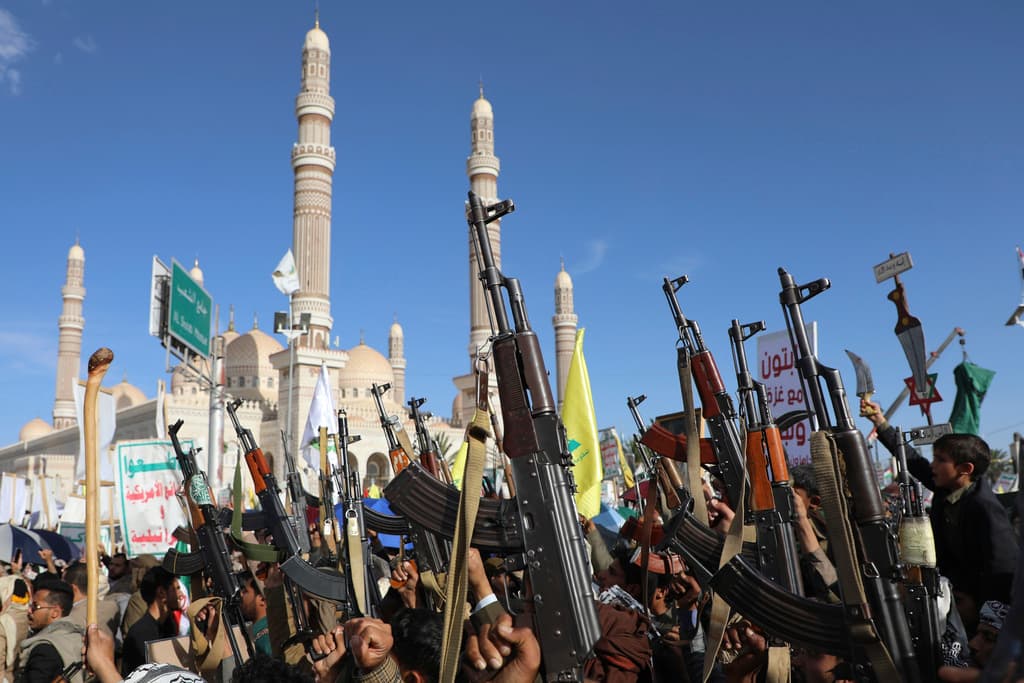Will Israel and Washington Finish the Job of Dismantling Tehran’s Proxies and Ending Iran’s Aggression?
The Assad regime’s collapse in Syria means the entire Iranian axis has been disrupted, and ‘as we learned today, it even stopped the Iraqi militias,’ a source within Mossad says, according to Kann News. Will the Houthis be next?

The Houthis are emerging as Iran’s last standing cat’s paw in the wake of Israel’s degradation of Tehran’s other proxies. Do the Israelis, or Washington, have in store a winning formula for dealing with the Yemen-based group — or, for that matter, a way to end the Islamic Republic’s aggression?
The day when pagers exploded across Lebanon, September 17, “was the tipping point of the war” against Hezbollah, a Mossad agent identified only by the alias Michael told “60 Minutes” in a segment aired Sunday. That day was indeed “a game changer,” a Mossad head of a division who was identified on the CBS program as Gabriel told Kann News on Monday.
Referred to by Kann as A, the Mossad division head explained that the psychological effects of the exploding beepers and Israel’s follow-up operations “brought Hezbollah to its knees.” The Assad regime’s collapse in Syria followed, meaning the entire Iranian axis had been disrupted, and “as we learned today, it even stopped the Iraqi militias,” he added.
An umbrella group of Iran-backed militias in Iraq known as the Popular Mobilization Forces agreed on Monday to stop attacking Israel, according to a report by a Lebanese mouthpiece of Hezbollah, Al-Akhbar. The group was said to have done so at the urging of the Iraqi prime minister, Mohammed al-Sudani.
Iraqi militias started launching drones and missiles toward Israel in the aftermath of the October 7, 2023, Hamas atrocities. Financed, armed, and trained by the Islamic Revolutionary Guards Corps, militias such as Harakat Hezbollah al-Nujaba mostly failed in its attacks — though two Israel Defense Force soldiers were killed and dozens injured on the Golan by a drone from Iraq.
The Islamic Republic is reportedly now concentrating all its efforts — arming, directing, and financing — on the Houthis, Tehran’s only proxy that remains largely intact. An Iranian-made ballistic missile from Yemen was intercepted by the IDF outside Israeli air space on Monday.
Over the weekend, though, an attempt to intercept another Houthi missile failed. The warhead miraculously exploded at a Tel Aviv playground, in between residential buildings, in the middle of the night. Only minor injuries were recorded; had it hit a few yards away, though, it would have killed many people. If the explosion had occurred a few hours later the playground might have been filled with children.
America ratcheted up air attacks against Sanaa and other Houthi targets in Yemen over the weekend. Even though Israel is 1,200 miles from Yemen, it also has conducted extensive attacks there in recent weeks, concentrating on ports, power plants, and other strategic targets.
Like Israel, America and others “see the Houthis as a threat, not only to world shipping, but also to world order,” Prime Minister Netnayahu wrote on X Monday. “Just as we acted forcefully against the terrorist arms of Iran’s evil axis, so we will act against the Houthis — with force, determination, and sophistication.”
Friendly fire forced two Navy pilots to eject from their F-18 on Sunday while American forces were hitting multiple Houthi targets in Yemen. The airmen were rescued, but as the Associated Press described it, the “shootdown underlines just how dangerous the Red Sea corridor has become.”
It might have also underlined America’s reluctance to escalate the fight against the Houthis and other Iranian proxies. Enemies might see the friendly fire incident as a sign that the U.S. military has become rusty. More worrisome, it indicates a lack of a comprehensive Yemen strategy.
Several security officials now openly say that no matter how extensive, strikes on the Houthis will fail to deter them. “We need to go for the head, for Iran,” Mossad’s chief, David Barnea, told Mr. Netanyahu’s security cabinet, Israel’s Channel 13 reported Sunday. “If we only hit the Houthis, it’s not certain we’ll manage to stop them.”
The much-celebrated beeper operation was followed by the killing of top Hezbollah leaders, including its secretary general, Hassan Nasrallah. These successes were the result of more than a decade of preparations and planning to address what the IDF has long considered to be the most formidable danger to Israel.
Unlike Hezbollah, the Houthis have until recently been off the Israeli military planners’ radar. “It isn’t that easy to develop detailed intelligence this fast,” a senior researcher at Israel’s Misgav Institute, Yossi Mansharof, tells the Sun.
The Islamic Republic, though, has long been in Mossad’s crosshairs. After the IDF decimated much of Iran’s air defenses, Israelis are seeing a rare moment of opportunity for further strikes. Officials are reportedly debating whether to act now or await President-elect Trump’s January 20 inauguration.
“We can’t use the pagers again, because we already did that,” the Mossad agent who was identified as Michael told 60 Minutes. “We’ve already moved on to the next thing — and they’ll have to keep trying to guess what the next thing is.”
Israel’s surprises already have significantly undermined Tehran’s “axis of resistance” strategy. Yet, while Israel significantly changed the game, it is yet to inflict a decisive game-ender — for which it might need much help from its American ally.

